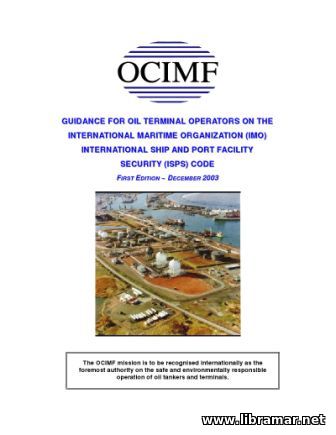 This official guidebook was officially released by OCIMF with the primary intention to provide all participants of the shipping industry, particularly terminal operators with all required information, which would aid the proper interpretation and, of course, subsequent implementation of the requirements applicable to the shipping port facilities.
Subject requirements are contained in a consolidated copy of the requirements outlines in the ISPS Code and presented in topical format, and an example model of a security plan. The two elements stated above are expected to assist the port facility operators in getting correct understanding of the current requirements. Among the main objectives declared by the compilers of this documents was establishing of the co-operation between contracting governments and agencies, local authorities, as well as port and shipping industries to assess and detect all potential security threats and also implement required preventative measures.
The authors of the paper have included as much of valuable information as possible, to ensure the exchange and collation of the associated info directly related to the security, and that the measures are enough proportionate and adequate. They all have also tried to provide a working and effective methodology to be used for assessing the security, plans and procedures to react to constantly changing levels of security.
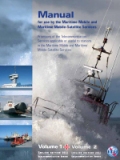 The present official ITU Manual has been released in accordance with the Radio Regulations, Article 20 and takes into consideration all results obtained in the course of the relevant technical studies conducted in the ITU-R. This set consists of two separate volumes. The first volume opens with the introductory information,, followed by the detailed system overview of the GMDSS describing the working principles, communication services. provision of MSI and major sub-systems.
The scope of main activities and responsibilities is also addressed here together with the general rules, radio- and operational procedures established within the system, proper use of the radio frequencies for alerting, requirements to the radio personnel, station identification, other procedures and related publication. The appendix contains the terminology and definitions, technical characteristics, tables of allocation, glossary and abbreviations.
The second volume of the set is intended to provide the extracts from the numerous regulatory documents directly associated with the maritime operations, such as the ITU Convention. Among the issues addressed in this part there are responsibilities, suspension of services, infringements, harmful interference, distress calls/messages, monetary unit, secret language and so many other relevant and important information.
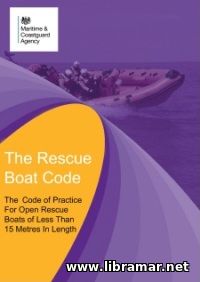 The official Rescue Boat Code released by the MCA, i.e. Marine Coastguard Agency. Among the main benefits in developing the present Code there were improved safety of the rescue boats, validation of the rescue operations by the MCA, harmonization of the operations and relevant standards, and classification of legal standings. The Code was re-drafted to reflect the latest updates done to the relevant standards and to clarify the responsibilities and applicable requirements to the examinations and MCA audits.
The content of the publication covers the definitions, application and interpretations, construction of the rescue boats and their strength, watertight integrity of the hull, arrangements for freeing the water, machinery arrangements and electrical installations, steering and propeller systems, freeboard and stability, bilge pumping arrangements, LSA including Personal Protective Equipment (PPE), fiire safety items including fixed and portable extinguishing systems, radio communications equipment, launch and recovery equipment, navigation equipment and navigation lights, boat storage, anchors and towing arrangements, equipment stowage, protection of personnel by design, medical care, owner's manual, maintenance, manning, procedures, certification, examination, maintenance and reporting of accidents, safety procedures, pollution prevention, testing...
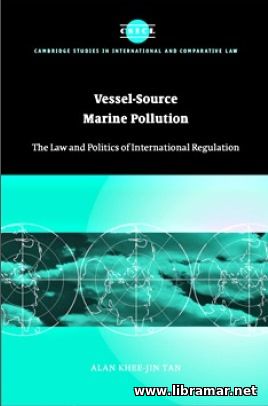 According to the reviews of the readers from all around the world, the author of this volume made a truly remarkable job in analyzing all complex issues relating to the marine pollution from marine vessels. As a result, this publication contains a very thorough analysis of all relevant regulations and investigation of the political and economic, as well as various social forces energizing and influencing making of the international rules.
Alan Khee-Jin Tan, the author of the volume, has also identified the most important deficiencies relating to the international maritime industry together with the regulatory system effective the whole effectiveness of the recognized rules and standards controlling the marine pollution. Moreover, the volume is suggesting various prescriptions in order to overcome or at least possibly reduce the impact such deficiency have.
There are three parts in this book. The part A is covering the regulations that are related to the vessel-source pollution in the eco-political context. The part B addresses the international legislative process and its relation to the pollution. The last part C is mainly dealing with the future of the such pollution regulation. The appendices that are there at the of the book, provide readers with the lists of treatises and articles, as well as relevant official reports and personal interviews...
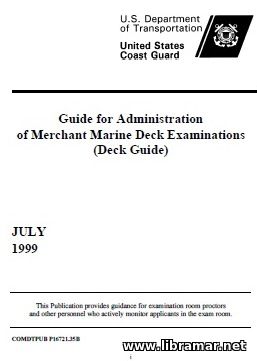 This is the official USCG publication which was prepared and formally released by the USCG with the aim to serve as a thorough guide for the administration of the exams of marine deck officers, or simply deck guide. The document is providing all required guidance for the proctors of the examination rooms and all other personnel directly engaged in the administration of the exams to obtain the license of merchant mariners.
All officers-in-charge plus the marine inspection/activity commanders of units shall ensure due compliance will all provisions of this document. The format and layout of the present release of the paper have been changed in order to show in tabular form all modules comprising the recommended professional exam for each of the licenses or document applicants. The partial examinations have been completely eliminated. All procedures and instructions are now combined in a single separate category titled Instructions.
The authors of the paper have also consolidated the deck reference and examination materials and some of the critical details have been added to be of practical use for the personnel of the examination room. The volume is also providing a complete list of module codes showing the module name appearing on the test booklet, types of applicant and brief explanation of the number derivation...
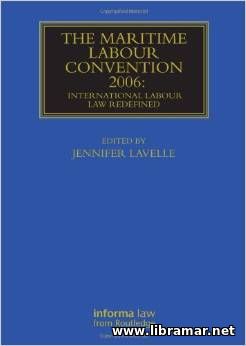 With the MLC Convention being in force since 2013, the maritime industry of today is facing the new international convention having quite comprehensive implications across all fields of the industry. The vitally important regulatory text is intended to provide the shipping industry with the timely analysis and thoughtful essays relating to the application of the above mentioned Convention and its practical enforcement.
The Convention itself is set to significantly change the field for the key players. The present publication offers its readers very interesting and diverse commentary in connection with the impact of the Convention on key sectors of the maritime industry, identifying the strong and weak sides of the Convention, together with the potential hurdles to overcome. Each of the chapters in this book is focusing on one particular aspect. Special attention has been paid by the authors of the publication to the enforcement done through the examination of various innovative measures that have been provided in the main body of the document.
The domestic mechanisms of enforcement of this Convention in particular Flag Administrations has also been discussed. Moreover, in this work the authors try to evaluate whether the MLC Convention has really filled the gaps that are still existing there in maritime labor law...
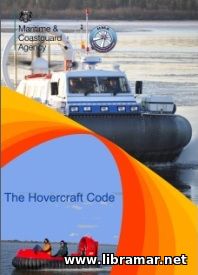 The present Code was developed to provide requirements to the UK Light and Small Hovercraft as well as to other Light and Small Hovercraft operating within UK waters, with the intention to set standards of safety and protection of people on board.
Traditionally, the Code addresses construction and structural strength, propeller and fan systems, stability and freeboard matters, weathertight integrity, electrical arrangements, fire fighting, lifesaving and radio equipment, navigation lights, shapes and other related equipment , anchoring and towing arrangements, personnel protection, safety management issues etc.
The primary objective held in mind at the time of developing of the present regulatory document was to set the technical standards of safety and protection of the people on board, with the particular attention being paid to the passengers and trainees. Several organizations well respected and recognized within the maritime industry have participated in the process of developing of the Code.
The document is subject to periodical review; it contains all the information required for the design and construction of the hovercrafts, engineering issues, electrical installations, hull systems and fire protection/fire fighting arrangements, LSA, navigation/radio equipment etc.
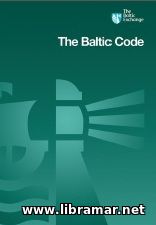 The present publication contains the Baltic Code which is considered to be one of the vital documents setting out the standards; subject recognized standards are expected from the members of the Baltic Exchange. The publication starts with the introduction and general info on the Baltic Exchange, followed by chapter dedicated to the ethics and market practice.
The next chapter provides some guidance to the modern shipping market practice together with the relevant terminology. After that, several chapters come dealing with the chartering and associated negotiations, chartering of the tankers, relevant disputes, ship sales and purchases. The closing chapters of the volume address the insurance matters, freight derivatives and associated organizations. This formal paper was initially released many years ago in 1983 and substantially revised in 2012. It has been arranged in three major sections. We would particularly recommend the section containing the short yet very comprehensive introductory guide to the shipping practice of today since it has already been found very useful by the Baltic members.
At the time when this volume was compiled, Baltic members did represent their interests through more than six hundred companies operating all around the world. Have a look into this paper in order to be aware of the information definitely useful to any participant of the shipping industry.
« 1 2 ... 16 17 18 19 20 ... 24 25 » |







